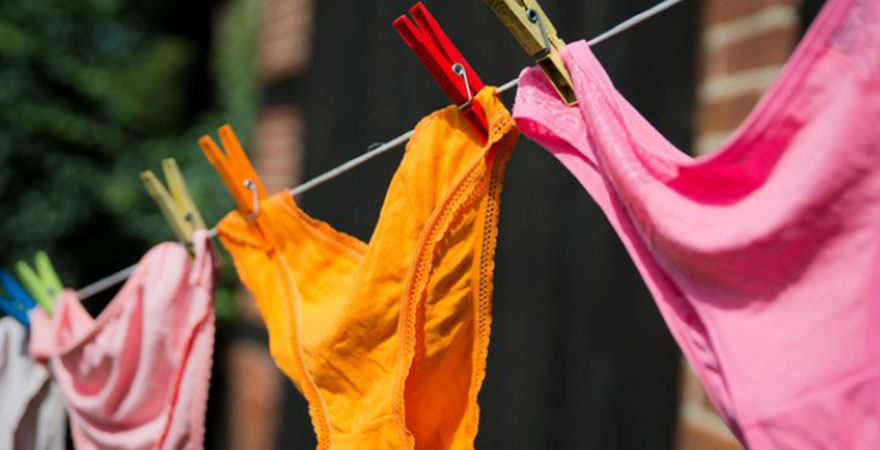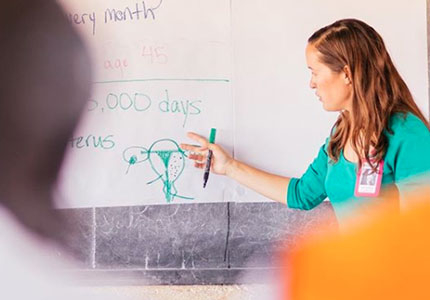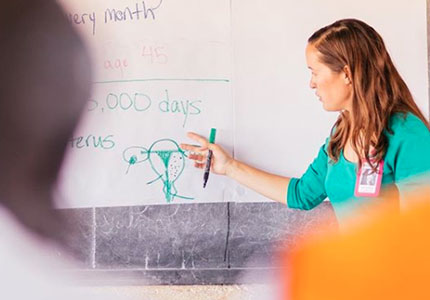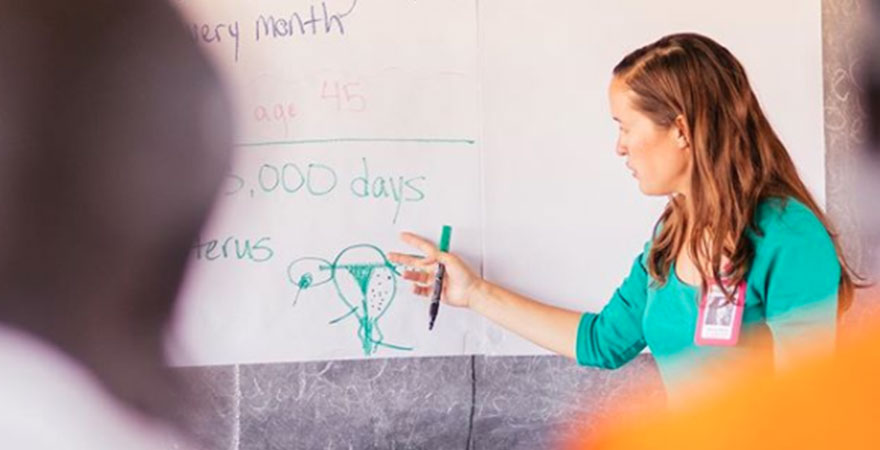This article was authored by Kaleigh Heard*
As an academic, I am interested in the political and health nexus of conflict, and three years ago, I was working on an academic study concerning sexual and reproductive health amongst forcibly displaced communities in Greece. As I explored the high rates of survival sex amongst young migrants, it became abundantly clear that the entire community had been left behind when it came to access to sexual and reproductive health products and education.

Men, women and kids were being provided ripped, stained, and previously worn underwear. Women were vocal about the difficulty they had accessing appropriate sanitary products and the ways they were made available to them, and the difficulty of finding contraceptives was a bit of an open secret within the community, and no one was ensuring there was safe and consistent access to vital sexual and reproductive health information and education for this very vulnerable community.
When I looked further, many gaps became clear. While existing charities were distributing sanitary products, many at that time had not asked the women what products they wanted and were distributing tampons, not sanitary towels. Tampons are culturally unacceptable to many women fleeing war and persecution. The other issue was the method of distribution. It turned out that these products were often handed out by men on a daily basis, in daily quantities, in a public place. Many women refused to face the humiliation of lining up to get the products they needed daily and ended up stuffing their underwear with torn strips of blankets or even pieces of old mattresses. Their underwear was non-existent or in rags and access to contraception, and the vital education surrounding it was non-existent. It was unacceptable to me.
[[[images 3-native]]]
My co-founder Megan Beck was also very much immersed in the refugee crisis response and was volunteering at several camps in Greece. When it became clear no one else wanted to deal with this problem, we decided to do something about it ourselves.
That’s when we decided to set up The Unmentionables, which is the only organisation that distinguishes between the wider category of non-food items (NFI) and those items that are difficult or embarrassing to access in a public distribution. We work only with undergarments, feminine hygiene products and contraception methods. This name reflects the fact that talking about sex, periods, sanitary products and underwear is often taboo among vulnerable populations who are seeking shelter in refugee camps.
We create distribution methods for products in a safe environment. In Greece, we have set up a free shop, which has a pricing system that works without financial exchange. Each individual is given a certain amount of Dignity Dollars, which can go towards purchasing underwear, sanitary products, and contraceptive methods. They can browse through the shop and pick what they want, ensuring each person has the dignity of choosing the products that work best for them.
In Africa, we use more traditional distribution methods, relying on refugee women themselves to deliver the products and the education in a cascade system. We train the women and then they go on to train more people, bring the resource right into the heart of their communities. The women who help us are paid a fair wage, which also helps incentivise them.
Our sanitary products are generally reusable since it is often isnt an option to constantly provide a fresh disposable supply. Each towel comes with its own bucket and soap and we ensure that the women have access to clean water. The bucket is also handy because the women can dry their towels inside the bucket on the roof tops of their dwellings away from prying eyes. In Greece, where the environment is a bit more stable, women also have access to a range of contraceptive methods, after they complete an education class or medical consultation. We cover the cost of the birth control while partner medical organizations administer the prescription.
A big part of what we do is education. I am a trained sexual health educator and so are several of my staff. We have institutional grants that cover organisational costs, but we also actively seek donations from independent benefactors who support our work.
I have a bit of a split life now as well as completing my PhD in political sciences focusing on civilians in conflict, my passion is The Unmentionables. I am grateful to have been given the chance to bring its work to a wider audience through my link with One Young World.
***
* Kaleigh Heard is the co-founder of The Unmentionables, a foundation that provides intimate health products and education to refugees and displaced persons. She is also an Ambassador for the global youth charity, One Young World.



